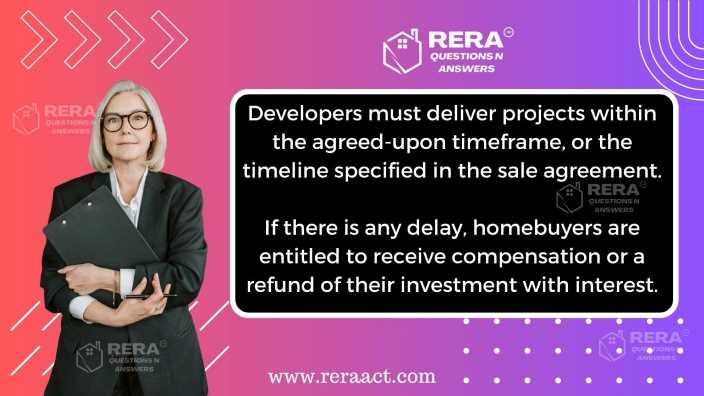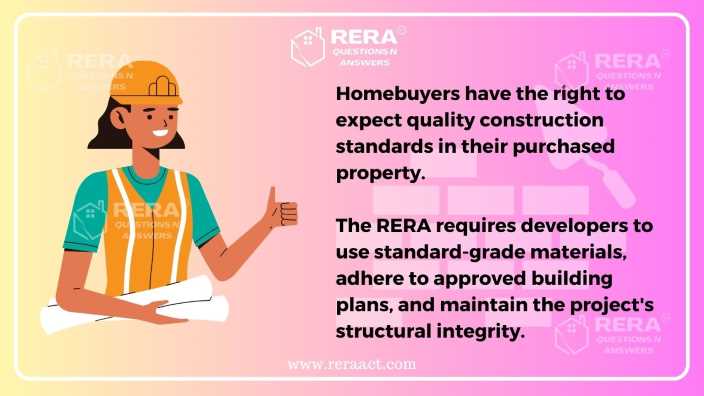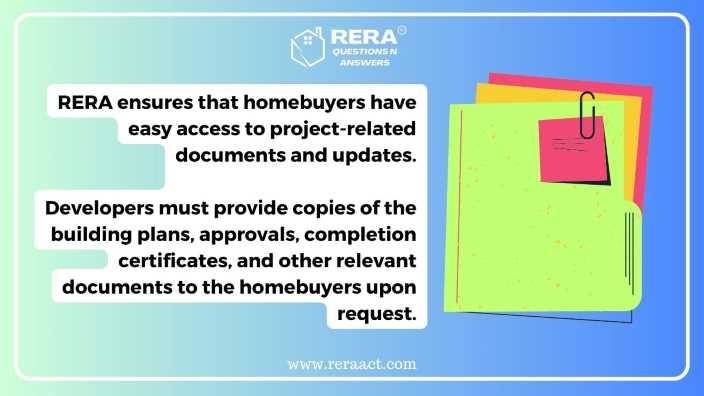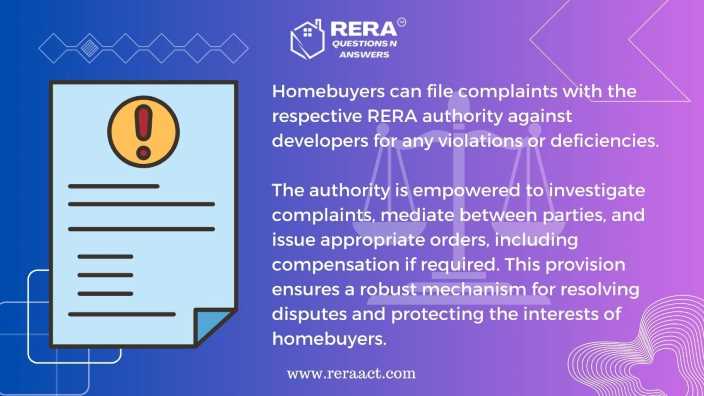Purchasing a home is a significant milestone in one’s life, but it can also be a complex and daunting journey.
The Indian Parliament introduced the Real Estate (Regulation and Development) Act 2016 (RERA) to protect the interests and rights of homebuyers.
RERA is a landmark legislation that aims to promote transparency, accountability, and fair practices in the real estate sector.
This article delves into the homebuyer rights in RERA Act 2016 and highlights the significance of these rights in ensuring a smooth and secure home-buying experience.
Right to Obtain Accurate Information
One of the fundamental rights bestowed upon homebuyers by the RERA Act is the right to obtain accurate and transparent information about the project.

Developers must provide detailed information regarding project plans, layout, government approvals, land title status, completion timeline, and financial disclosures.
The above empowers homebuyers to make informed decisions and protects them from misleading advertisements or misrepresentation of facts.
Right to Timely Possession
Under the RERA Act, developers must deliver projects within the agreed-upon timeframe or the timeline specified in the sale agreement.

If there is any delay, homebuyers are entitled to receive compensation or a refund of their investment with interest.
This provision ensures that developers adhere to project schedules. It will reduce delays and financial losses for homebuyers.
Right to Transparent Sale Agreements
Homebuyer rights in RERA mandate that developers must provide standardised sale agreements.

The above must include all essential terms and conditions, such as carpet area, pricing, possession date, penalties for default, and construction specifications.
It prohibits unfair contract terms and ensures the developer does not execute arbitrary changes or one-sided clauses against the homebuyers.
Additionally, developers must register the sale agreement with the appropriate authority, ensuring its legal validity.
Right to Quality Construction
Homebuyer rights in RERA give the homebuyer the right to expect quality construction standards in their purchased property.

The RERA requires developers to use standard-grade materials, adhere to approved building plans, and maintain the project’s structural integrity.
In case of any structural defects or poor craftsmanship within a specified time after possession, homebuyers have the right to have these issues rectified by the developer at no additional cost.
Right to Access Project-related Documents
Homebuyer rights in RERA ensure that homebuyers have easy access to project-related documents and updates.

Developers must provide copies of the building plans, approvals, completion certificates, and other relevant documents to the homebuyers upon request.
It enables them to verify the project’s compliance with regulations and helps them make informed decisions.
Right to Redressal and Compensation
The RERA Act establishes Real Estate Regulatory Authorities (RERAs) at the state level to address grievances and disputes.

Homebuyers can file complaints with the respective RERA authority against developers for any violations or deficiencies.
The authority is empowered to investigate complaints, mediate between parties, and issue appropriate orders, including compensation if required. This provision ensures a robust mechanism for resolving disputes and protecting the interests of homebuyers.
Conclusion
The RERA Act 2016 has significantly empowered homebuyers in India by acknowledging and safeguarding their rights.
It has brought transparency, accountability, and efficiency to the real estate sector, promoting fair practices and reducing fraudulent activities.
With the establishment of RERAs, homebuyers now have a reliable forum to address their concerns and seek redressal.
The RERA Act ensures homebuyers can confidently embark on their home-buying journey by protecting their interests and rights.
Frequently Asked Questions
What is the RERA Act 2016, and how does it impact homebuyers?
The RERA Act 2016 is legislation enacted in India to protect the rights and interests of homebuyers.
It aims to bring transparency, accountability, and fairness to the real estate sector.
It establishes guidelines and obligations for developers, ensuring they provide accurate information about projects, adhere to project timelines, maintains quality construction standards, and offer standardised sale agreements.
It also establishes a regulatory authority at the state level to address grievances and disputes, providing a platform for homebuyers to seek redressal.
Overall, the RERA Act significantly empowers homebuyers and promotes a secure and reliable home-buying experience.What information are developers required to provide to homebuyers under the RERA Act?
As per the Homebuyer Rights in RERA, developers must provide them with comprehensive and transparent information.
It includes details about the project, such as approved plans, layout, government approvals, land title status, completion timeline, and financial disclosures. The act ensures homebuyers can access accurate and reliable information, enabling them to make informed decisions.
Developers must disclose these details upfront, preventing misleading advertisements or misrepresentation of facts.What rights do homebuyers have regarding possession of their purchased property?
Homebuyer Rights in RERA have provided them with the right to get timely possession of their purchased property under the RERA Act.
Developers must deliver the project within the agreed-upon timeframe or the timeline specified in the sale agreement. If there is any delay in possession, homebuyers are entitled to receive compensation or a refund of their investment with interest.
This provision ensures developers adhere to project schedules, minimising financial losses and inconvenience for homebuyers. The right to timely possession protects the interests of homebuyers and encourages developers to complete projects as per the agreed-upon terms.How does the RERA Act ensure transparency in sale agreements?
The RERA Act ensures transparency in sale agreements by requiring developers to provide these in a standardised form to homebuyers.
These agreements must include essential terms and conditions such as carpet area, pricing, possession date, penalties for default, and construction specifications.
The act prohibits unfair contract terms and safeguards homebuyers from arbitrary changes or one-sided clauses.
Additionally, developers must register the sale agreement with the appropriate authority, ensuring its legal validity.
This provision promotes transparency, fairness, and clarity in the contractual relationship between developers and homebuyers, protecting the latter’s interests.What measures are in place to protect homebuyers from poor construction quality?
The RERA mandates the acceptable quality of construction (as per the local government guidelines) from part of the developers.
They must maintain standard-grade materials, adhere to approved building plans, and ensure the project’s structural integrity.
The developer may provide structural defects or poor craftsmanship within a specified time after possession.
Homebuyers have the right to have these issues rectified by the developer at no additional cost.
This provision holds developers accountable for the quality of construction, safeguarding the interests of homebuyers and ensuring that they receive a property that meets the expected standards.Can homebuyers request access to project-related documents, and what documents are they entitled to?
Homebuyers have the right to access project-related documents under the RERA Act.
Developers must provide copies of essential documents upon the request of home buyers.
These documents may include building plans, approvals from relevant authorities, completion certificates, and other relevant records.
By granting access to these documents, RERA enables homebuyers to verify the project’s compliance with regulations, assess the progress and status of the project, and make informed decisions based on reliable information.
This provision enhances transparency and empowers homebuyers to participate actively in the home-buying process.How can homebuyers seek redressal and compensation under the RERA Act?
Homebuyers can seek redressal and compensation under the RERA by filing complaints with the Regulatory Authority established at the state level.
If homebuyers face any violations or deficiencies by the developer, they can approach the RERA authority to address their grievances.
The authority can investigate complaints, mediate between parties, and issue appropriate orders, including compensation if required.
This provision ensures a robust mechanism for resolving disputes and protecting the interests of homebuyers, offering them a reliable forum to seek justice and fair treatment in case of any issues related to their property purchase.Are there any penalties or consequences for developers who fail to comply with the RERA Act?
Under the RERA, developers who fail to comply with its provisions may face penalties and consequences.
These can include fines, imprisonment, or both, depending on the severity of the violation.
The act empowers the regulatory authority to take suitable actions against developers, such as imposing penalties, revoking project registration, or even initiating criminal proceedings.
These measures serve as deterrents to ensure that developers adhere to the regulations and fulfil their obligations towards homebuyers.
The penalties and consequences outlined in the RERA Act promote accountability, transparency, and fair practices in the real estate sector, safeguarding the rights and interests of homebuyers.Does the RERA Act apply to all real estate projects in India, regardless of size or location?
Yes, the RERA applies to all real estate projects in India, regardless of their size or location.
The act covers residential and commercial projects, including apartments, plots, villas, and commercial buildings.
It aims to bring transparency, accountability, and fairness to the whole real estate sector by protecting the homebuyers’ rights in the nation.
The applicability of the RERA Act to all projects helps create a level playing field.
The above establishes a consistent framework for the Indian real estate industry’s regulation and development.How has the RERA Act benefited homebuyers in promoting fair practices and reducing fraudulent activities in the real estate sector?
The RERA Act has greatly benefited homebuyer rights in RERA in India by promoting fair practices and reducing fraudulent activities in the real estate sector.
It has brought about transparency and accountability by mandating developers to provide accurate information, standardised sale agreements, and timely possession of properties.
Regulatory authorities’ establishment at the state level has provided a platform for homebuyers to address grievances and seek redressal, ensuring their rights are protected.
The act has also enhanced the quality of construction by setting standards and holding developers accountable for defects or poor craftsmanship.
Overall, the Homebuyer Rights in RERA have instilled confidence in homebuyers, making the home-buying process more secure and reliable in India.

